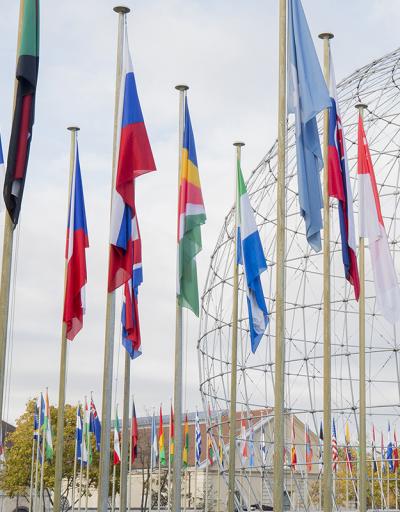Plenary conference with 5 partner universities
Silvia Giorguli
Silvia Elena Giorguli Saucedo is the president of El Colegio de México (COLMEX). COLMEX is a public, university-based institution dedicated to research and higher education in the social sciences and humanities, and is one of the most prominent in the Hispanic world, for which it has received numerous awards since its founding in 1940 to the present.

Lourdes Arizpe
PhD. Lourdes Arizpe Schlosser, is a Mexican social anthropologist. She received a master's degree from the Escuela Nacional de Antropología de México (ENAH) in Mexico and a PhD in ethnology from the London School of Economics (LSE). In her fieldwork she pioneered studies on migration, indigenous cultures, peasant women and later in studies on global change, environment and cultural policies, both national and international.



Madhav Das Nalapat
Professor Madhav Das Nalapat, is Director of Geopolitics and International Relations at Manipal Academy of Higher Education (MAPE) in India and UNESCO Peace Chair. He is also Editorial Director of The Sunday Guardian and Itv network (India), and Vice-Chair of Manipal University’s Advanced Research Group. He has been Editor of the Times of India and Editor of the Mathrubhumi. Dr. Nalapat writes expertly on international affairs and appears regularly on global media as a respected authority on geopolitics.

Déborah Perez
Déborah Perez is an Assistant Professor at Mohammed VI Polytechnic University. Her research interests deal with political actors, parliaments, and regime change in the Maghreb. A former student from the École Normale Supérieure, she gained a PhD at Sciences-Po Aix-en-Provence.
Her PhD dissertation received a special mention from the GIS Moyen-Orient et Mondes Musulman. It tackles the way members of the Tunisian National Assembly Constituent invested their roles. Her fieldwork on the MPs of the Tunisian National Constituent Assembly during the elaboration of the new Constitution and the electoral campaigns lead her to analyze a crucial episode of the change of regime in Tunisia – characterized by the renewal of the political body, by the drafting of a new Constitution and by the first peaceful alternation of power following elections – so as to understand how the practices of the MPs are rich in democratic experimentations yet also in authoritarian legacies.

Sâ Benjamin Traoré
Sâ Benjamin Traoré is an Assistant Professor at Mohammed VI Polytechnic University.
He is from Burkina Faso and holds a PhD from the University of Neuchâtel and an LLM from the Geneva Academy of International Humanitarian Law and Human Rights and a Master’s in law from the University of Ouagadougou (Burkina Faso). His academic work covers various subjects ranging from Public international law, the law of international organizations, the use of force in international law, human rights, international humanitarian law and Business and human rights. He is the author of a book on The Interpretation of United Nations Security Council Resolutions (Helbing, Basel, 2020).

Huang Ping
PhD. (LSE, London, 1991), Professor Huang Ping is a senior research fellow of Chinese Academy of Social Sciences since 1997, and is currently the Director of the Centre for Taiwan, Hong Kong and Macau Studies at the Chinese Academy of Social Sciences, and Executive Vice President of the Chinese Institute of Hong Kong. He is formerly the Director of the Institute of American Studies and the Director of the Institute of European Studies at the Chinese Academy of Social Sciences, and the former Executive Editor-in-Chief of Readings, etc.

Sarina Bakić
Prof. PhD. Sarina Bakić, is an associate professor at the Faculty of Political Sciences, University of Sarajevo, Department of Sociology. She graduated in sociology at the Faculty of Political Sciences of the University of Sarajevo, where she received her master's degree in 2012 in the field of communication sciences. Her narrower scientific field of activity is the sociology of culture and art, she investigates various phenomena of mass culture, aesthetics and the relationship between art and politics, deals with the culture of memory, segments of intercultural dialogue and cultural diplomacy. She is the winner of the University of Sarajevo award for scientific/artistic work for the year 2021.

Amila Ždralović
Prof. PhD. Amila Ždralović, completed the Faculty of Philosophy in Sarajevo - Department of Philosophy and Sociology. Received a master diploma (2007) and PhD (2016) from the Faculty of Political Science in Sarajevo - field: Sociology. She is currently working as an assistant professor at the Faculty of Law in Sarajevo, in the subjects: Sociology, Sociology of Law and Methodology of Social Sciences. Areas of interest: sociology of law and methodology of social sciences and legal research, feminist theory.

Senayon Olaoluwa
Dr. Senayon Olaoluwa, is a lecturer and researcher interested in Diaspora and Transnational Studies. He is currently a Visiting Fellow at the Africa Studies Centre, University of Oxford, as part of the Africa Oxford Visiting Fellowship Programme.
Senayon is affiliated with the Institute of African Studies at the University of Ibadan, Nigeria, where he teaches and researches Diaspora and Transnational Studies. He is also the Founder of the Ibadan School of Diaspora Studies. Dr Olaoluwa’s work has been published in African Affairs, African Studies Review, Journal of African Cultural Studies, Research in African Literatures, and ISLE: Interdisciplinary Studies in Literature and Environment. Senayon obtained his PhD in Humanities from the University of the Witwatersrand, South Africa.



